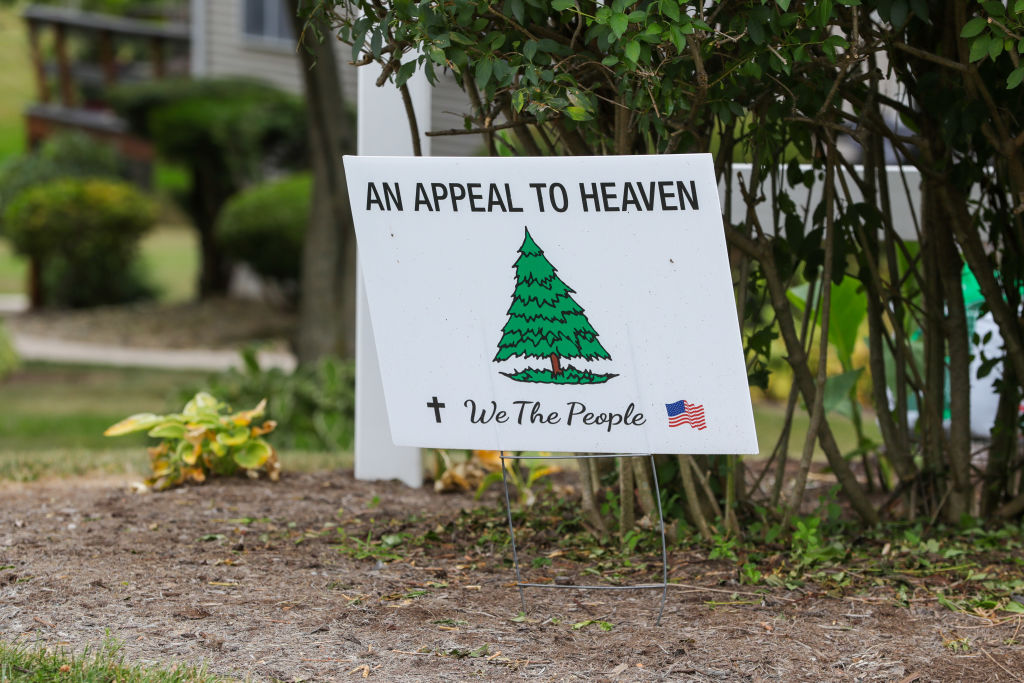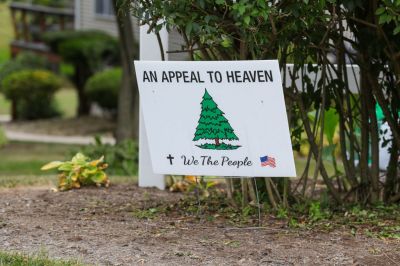Over the past year, progressive journalists have invested in wide-ranging investigations of the Supreme Court, from the justices’ friendships, to their finances, to their families—but now the New York Times has discovered a whole new category of scandal: their taste in flags.
To wit, on Thursday evening the Times announced that “Another Provocative Flag Was Flown at Another Alito Home.” For the second time in as many weeks, Supreme Court Justice Samuel Alito had been discovered displaying a sigil “carried on Jan. 6” and what’s worse, this one is “associated with a push for a more Christian-minded government.”
But the offending flag, adorned with a pine tree and the caption “An Appeal to Heaven,” is not some special symbol of the alt-right or insurrection. It’s an American flag, and the rebellion it embodies is that of our forefathers against the British crown.
The “Appeal to Heaven” or “Pine Tree Flag” was originally flown by ships in George Washington’s revolutionary Navy (such as it was). The pine tree was a common insignia in colonial America, appearing on various flags, particularly in New England, from the 17th century onward; to this day it remains an official naval ensign of the state of Massachusetts (the state removed the “Appeal to Heaven” in 1971).
When colonists arrived in the 17th century, the eastern portion of North America was more or less one great forest. England had long since denuded its own forests, making American lumber such a key resource that the Massachusetts Bay colony added a “Mast Preservation Clause” to its charter ensuring that appropriate trees would be reserved for the British Navy. Hence the pine tree.
The “Appeal to Heaven” bit—sometimes styled “Appeal to God” (slogans were less consistent before one could Google them)—comes, not from the Turner Diaries or the Grand Inquisitor, but from John Locke, whose Second Treatise on Government held that “where the body of the people, or any single man, is deprived of their right, or is under the exercise of a power without right, and have no appeal on earth, then they have a liberty to appeal to heaven, whenever they judge the cause of sufficient moment.” In other words: If the king has become a tyrant, the only appeal is to the higher sovereign by way of revolution—an awkward formulation for our secular era, but this was when people believed sovereigns ruled by divine right. Revolution was a petition to the almighty to reverse the court below.
The Times contends that the pine tree was an obscure symbol, a “historical relic” forgotten “until about a decade ago,” when it was “revived to represent “a theological vision of what the United States should be” by a conservative pastor it disapproves of. But this would be news to the producers of the 2008 HBO miniseries about John Adams, which included the Appeal to Heaven among the Gadsden and other revolutionary flags adorning its opening credits. It would also be surprising to the New York Times of not so long ago, which in 2010 wrote about how the “Tea Party [was] Rooted in Religious Fervor for [the] Constitution,” a news report that opens with an activist in a tri-corner hat holding said flag (the Times even included a picture of it, green tree and all) as the activist extolled the virtues not of theocracy but of the civil religion of American constitutionalism.
I have no particular knowledge of the intentions of Justice Alito or his wife, nor their hearts. The prior incident uncovered by the Times—in which Martha-Ann Alito hung an American flag upside down outside their home in January 2021 as part of an apparent tit-for-tat with neighbors who’d displayed their own provocative signs—was a breach of patriotic etiquette. It’s true enough that some participants carried the flag up the steps of the Capitol the wrong way up; but even the Times was forced to admit there’s nothing particularly right-wing about such a display: Causes of all sorts have flipped the Stars and Stripes over the decades. (In 2017 Salon declared such “an act of true patriotism.”)
Perhaps the Alitos have the sort of sympathy with attempts to “Stop the Steal” the Times attributes to them. Or perhaps Justice Alito simply viewed the “Appeal to Heaven” flag as an expression of patriotism, knowing it was commissioned under George Washington himself. Or perhaps the appellate jurist enjoyed the pun implied by flying a flag appealing to a higher court. Any public official wielding the power of the state is fairly subject to criticism, even for private beliefs not directly relevant to their constitutional role—and few matters are more serious than attempts to obstruct the constitutional transfer of power. But it’s not just unfair to assume a traditional patriotic symbol is being flown with some other secret intent; to assume so is to cede patriotism itself to whichever mob happens to invoke it, however noble or maligned their intent.
In the office where I write this hangs a large version of the Gadsden flag—the contemporary “No Step on Snek” permutation. I also have a Gadsden headcover for the putter that’s sitting in the corner in my golf bag. I don’t particularly care that Christopher Gadsden’s symbol of American intransigence in the face of oppression was carried by those who stormed the Capitol, but it doesn’t belong to them. They carried American flags as well; that doesn’t make the Stars and Stripes their intellectual property. If tomorrow Vladamir Putin declared his love for pork ribs and collard greens, that wouldn’t turn American barbecue into Russian cuisine.
Symbols are funny things (which is why they’re responsible for one of the more headache-inducing branches of philosophy). There are fair criticisms of those still flying Confederate flags, but Bo and Luke Duke just thought it looked cool on top of their car. Nor did I buy the Lynyrd Skynyrd T-shirt that’s probably still in some random drawer in my childhood bedroom out of fealty to the Army of Northern Virginia. The Jewish gangster in The Great Gatsby owns a front called “the Swastika Holding Company.” But Fitzgerald wasn’t making an antisemitic joke: At the time the future Nazi insignia simply represented prosperity and good fortune. Let’s concede that the Times is correct to say the pine tree is popular among Christian nationalists: the Times cites the specific case of Pastor Dutch Sheets, who has adopted the “Appeal to Heaven” meme and even gave the flag as a gift to then-President Donald Trump.* But the unilateral appropriation of a symbol by faction does not define it for all others. The Punisher Skull’s popularity among militia-types doesn’t mean fans of Marvel Comics are plotting the violent overthrow of the government.
The Times interviews many breathless legal ethicists who insist that it is some kind of breach for Justice Alito to express his political leanings. But here’s the question: What political leanings? Fealty for the cause of George Washington? An appeal for the blessing of providence? The Times relies on its prior reporting of the Alitos’ inverted Old Glory to attempt to answer that question, but that reporting indicates that this transgression of the Flag Code was committed by Martha-Ann Alito as part of a personal dispute with neighbors. Tying that incident to an entirely different and unobjectionable flag flown at a different home in the summer of 2023 is the sort of dot connecting usually carried out on a pinboard covered in red string and newspaper clippings about Bohemian Grove and the Bilderberg Group.
Nor is it practical (or desirable) for justices to avoid any political allusions at any time. As it happens, we have Justice Elena Kagan’s emails from her time in the Obama administration, in which she cheers on the passage of the Affordable Care Act (ACA). Yet she has participated as a justice in every major case about the ACA anyway, because we expect jurists to strive for fairness and impartiality, not to be inhumanly detached from the affairs of man.
There are reasonable debates to be had about where and when a member of the federal bench crosses the line, but the public display of support for the American Revolution is not an expression of partisanship—unless you’re on the side of King George.
Correction, May 25, 2024: This story has been updated to correct the first name of Pastor Dutch Sheets.






Please note that we at The Dispatch hold ourselves, our work, and our commenters to a higher standard than other places on the internet. We welcome comments that foster genuine debate or discussion—including comments critical of us or our work—but responses that include ad hominem attacks on fellow Dispatch members or are intended to stoke fear and anger may be moderated.
With your membership, you only have the ability to comment on The Morning Dispatch articles. Consider upgrading to join the conversation everywhere.